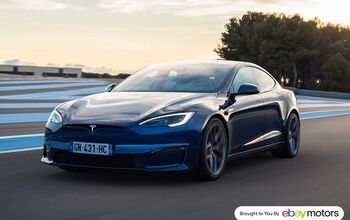Major Suppliers Agree: Turbocharging is Way Forward

There's a new boss in Motor City, and it ain't Mr. Cubic Inches. Carmaker doing business stateside are increasingly adopting third (or is it fourth?) generation turbochargers to create smaller, more efficient gasoline engines– and satisfy new, stricter federal fuel economy regs. For example, VW's new TSI mill combines excellent fuel economy with good performance and so-so driveability. The Passat 1.4-liter TSI cranks out 122hp; enough to propel Wolfsburg's warrior from zero to 60mph in 10.4 sec. This while achieving 36 mpg (European model, U.S. gallons, EU testing cycle). Suppliers are scurrying to build blowers. BorgWarner's constructing new turbo-making facilities in Mexico and Thailand; and expanding facilities in Hungary and Poland. Their goal: increase its passenger car turbocharger manufacturing capacity by more than three million units. Rival Continental is set to open a new turbocharger factory in 2011, making 100k spinners a year. Is whistling the new burble?

More by Martin Schwoerer

































Comments
Join the conversation
I think the turbos= fuel economy argument is a ruse ljw- your thoughts are correct. The turbo 4s of the 80s didn't get any better fuel economy than the NA V6s. The turbo 4 push might be more about safety ratings than efficiency. A turbo 4 is smaller than a DOHC V6, it makes it easier to design the crumple zones.
Passat is not twice as large as Prius. It's a lot bigger outside and only little bit bigger inside, but not by much. At highway speeds when using cruise control with higher longer gears turbocharged engine basically stays off boost and with smaller displacement and direct injection you can acheive great mpg numbers. You basically only need boost for overtaking maneuvers or uphill climbs. Evo, WRX etc. are flat-out performance oriented vehicles that have completely different gearing, boost levels, air/fuel ratio, turbocharger desing, engine mapping etc. when compared to ordinary lower pressure turbocharged family car engines - for example the types that VAG makes.
I wouldn't mind seeing more turbo cars hit the market. More for us boy racers to play with! My friend's 1.8t GTI got the same gas mileage and made the same power as the 2.4L car I was driving at the time. However, it seems to come down to how much effort the manufacturer is willing to put into tuning their motors to produce efficient power, with good gas mileage. A lot of turbo cars aren't much more efficient than a big-bore equivalent (ie. TSX 2.4L vs VW AG 2.0FSI, BMW twin turbo vs Nissan/Infiniti VQ), although they do produce more torque.